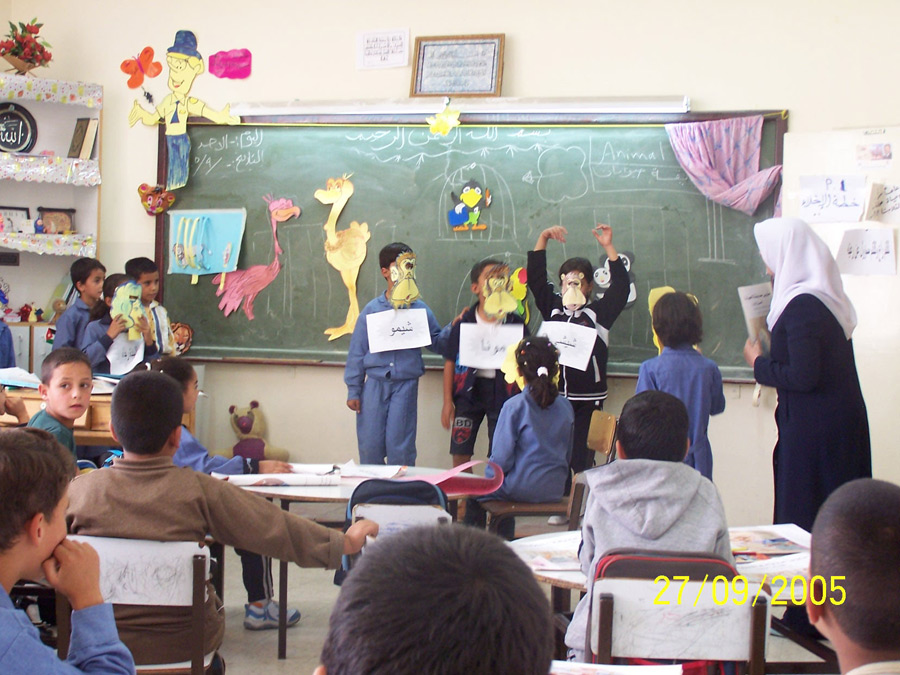Educational program gives researchers, students greater insight into Arab world

In Amman, Jordan, a class of eager-to-learn third graders are actively engaged in a skit, using colorful masks and props to act out the relationship between a zoo keeper and the animals in the zoo. The skit is cleverly designed to illustrate social responsibility. In another building, high school students are discussing the lack of public transportation accommodations for people with disabilities. Having identified this problem, they have been investigating potential solutions. Subsequently, the students will be making public policy recommendations to local officials and to the Ministry of Health and Community.
These two groups of students are benefiting from programs, Foundations of Democracy (elementary school) and Project Citizen (high school), designed by the U.S. based nonprofit Center for Civic Education. The center supports Arab Civitas, an organization dedicated to promoting democracy education and provides resources, teacher training and opportunities to showcase student projects. In addition to Jordan, Arab Civitas is comprised of representatives from seven other Arab countries: West Bank {Palestine}, Egypt, Morocco Algeria, Tunisia, Lebanon and Yemen.
Russ Cargo, co-director, Institute for Governance and Accountabilities (IGA), School of Public and International Affairs (SPIA), Virginia Tech, National Capital Region, recently had an opportunity to visit schools in Jordan and observe first-hand the third-grade and high school democracy education classes. The Institute for Governance and Accountabilities is helping the Arab Civitas Board of Program Directors organize itself to more effectively support the democracy education effort in the participating countries.
“The level of commitment and enthusiasm for the democracy education program are very high among the administrators and classroom teachers in Amman,” said Cargo, of his visit to the schools. “I was also very impressed by the quantity – and quality – of the resource materials available for both teachers and students involved in the democracy education program.
“Keen interest for the program carried through in the classrooms,” said Cargo. “The students I observed at both the elementary and high school levels were very connected, taking an active role in discussions and activities and, even more importantly, learning to work together as a team.”
Beyond the initial objective of helping Arab Civitas organize its board to better support democracy education, the Institute for Governance and Accountabilities will advise the organization and its participating country programs on capacity building so they may reach a level of self-sustainability.
“Developing a relationship with Arab Civitas is important for us as a research institute,” said Cargo. “Our work with this group provides us with invaluable access to people and organizations in the Arab world, a geographical area where our knowledge of voluntary action and philanthropy is quite limited. Involvement with Non-Governmental Organizations (NGO) in the Middle East, at the ground level, during a critical time of their initiating democracy, can provide Virginia Tech with the opportunity to conduct comparative research on governance structures among different Arab states and with U.S. models, study a collaborative governance structure among multi-country representatives in a region known for problematic relationships and learn how NGO-based programs can impact a culture.”
Cargo points out another advantage: the Institute for Governance and Accountabilities will also bring the experience of working with Arab NGOs directly back to the classroom. This will directly help graduate students studying nonprofit management at Virginia Tech to better understand the Arab world and global society in general.
“By increasing international recognition for the institute and Virginia Tech among Arab countries, we will greatly improve our experience base from which to engage in future consulting and research projects in that region of the world, and, at the same time, continue to enhance our graduate programs in the School of Public and International Affairs,” said Cargo.



